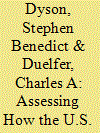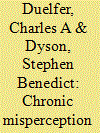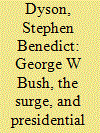|
|
|
Sort Order |
|
|
|
Items / Page
|
|
|
|
|
|
|
| Srl | Item |
| 1 |
ID:
175600


|
|
|
|
|
| Summary/Abstract |
The successful conduct of international relations relies on deducing the intentions of friends and foes. Decisionmakers in one country must make sense of the thoughts and actions of those in other countries.
|
|
|
|
|
|
|
|
|
|
|
|
|
|
|
|
| 2 |
ID:
105978


|
|
|
|
|
| Publication |
2011.
|
| Summary/Abstract |
Why did the United States and Iraq find themselves in full-scale conflict with each other in 1990-91 and 2003, and in almost constant low-level hostilities during the years in-between? The situation was neither inevitable nor one that either side, in full possession of all the relevant information about the other, would have purposely engineered: in short, a classic instance of chronic misperception. A combination of the psychological literature on perception and its pathologies with the almost unique firsthand access of one of the authors to the decisionmakers on both sides-the former deputy head of the United Nations weapons of mass destruction inspection mission in the 1990s, the author of the definitive postwar account of Iraqi WMD programs for which he and his team debriefed the top regime leadership, and a Washington insider in regular contact with all major foreign policy agencies of the U.S. government-reveals the perceptions the United States and Iraq held of each other, as well as the biases, mistakes, and intelligence failures of which these images were, at different points in time, both cause and effect.
|
|
|
|
|
|
|
|
|
|
|
|
|
|
|
|
| 3 |
ID:
101317


|
|
|
|
|
| Publication |
2010.
|
| Summary/Abstract |
Stephen Benedict Dyson discusses the impact of George W. Bush's personality and belief system on the decision to surge troops in Iraq. He argues that absent Bush's distinctive approach to leadership, the surge decision would not have been made
|
|
|
|
|
|
|
|
|
|
|
|
|
|
|
|
| 4 |
ID:
164185


|
|
|
|
|
| Summary/Abstract |
Content analytics applied to open source material can assist in understanding, predicting, and influencing the behavior of foreign political leaders. We provide evidence to this effect by profiling Russian President Vladimir Putin, who remains a source of consternation to the academic, intelligence, and policy communities. We apply the operational code scheme to a corpus of over one million words spoken by Putin across his time in office, and use the results to adjudicate between the competing portraits of him in the extant literature. We find Putin to hold broadly mainstream beliefs about international politics, albeit qualified by hyper-aggressiveness toward terrorism and a startling preoccupation with political control. His approach is that of an opportunist rather than a strategist. These data represent a stream of information that must be combined with other sources and integrated, through policy judgment, into a comprehensive approach to a foreign political leader.
|
|
|
|
|
|
|
|
|
|
|
|
|
|
|
|
| 5 |
ID:
133416


|
|
|
|
|
| Publication |
2014.
|
| Summary/Abstract |
The US intelligence community prepares occasional psychological profiles of foreign political leaders. The origins of these practices lie in frantic and ad hoc attempts to understand the character of Adolf Hitler during the latter stages of the Second World War. The US Office of Strategic Services (OSS) commissioned profiles of Hitler, contracting with a titan of personality theory in Professor Henry A. Murray and practicing psychoanalyst Walter C. Langer. Reconstructing the history of these profiles grounds the contemporary analysis of foreign leaders in the lessons of the pioneers. Useful insights on the challenges of profiling leaders, the relationship of academic theories - and academic personnel - to government, and the role of intelligence in policy abound.
|
|
|
|
|
|
|
|
|
|
|
|
|
|
|
|
| 6 |
ID:
072144


|
|
|
|
|
| Publication |
2006.
|
| Summary/Abstract |
The British choice in Iraq has been characterized as "Tony Blair's War," with many believing that the personality and leadership style of the prime minister played a crucial part in determining British participation. Is this the case? To investigate, I employ at-a-distance measures to recover Blair's personality from his responses to foreign policy questions in the House of Commons. I find that he has a high belief in his ability to control events, a low conceptual complexity, and a high need for power. Using newly available evidence on British decision making, I show how Blair's personality and leadership style did indeed shape both the process and outcome of British foreign policy toward Iraq. The research reemphasizes the importance of individual level factors in theories of foreign policy, as well as offering a comprehensive explanation of a critical episode.
|
|
|
|
|
|
|
|
|
|
|
|
|
|
|
|
| 7 |
ID:
091484


|
|
|
|
|
| Publication |
2009.
|
| Summary/Abstract |
Secretary of Defense Donald Rumsfeld exercised great influence over U.S. policies in the invasion and subsequent occupation of Iraq. The Secretary's leadership presents a puzzle-accounts agree that Rumsfeld was a masterful bureaucratic infighter who ruthlessly gained control over the major decisions and marginalized colleagues, yet, having secured that control, was remarkably blasé about events on the ground in Iraq. I argue that Rumsfeld's paradoxical performance was rooted in key aspects of his worldview-measured through systematic content analysis of his verbal output on the principle that the words individuals say are related to the way they see the world-and his bureaucratic style, identified through interviews with Bush administration insiders. Rumsfeld's worldview centers on a low perception of the control of self in relation to macro-political events, and a very high conceptual complexity, indicating a nuanced view of issues. This low perception of control and heavily contingent worldview is the discursive, "stuff happens" side of Rumsfeld which so frustrated critics of the U.S. occupation. His bureaucratic style, however, was controlling, suspicious, and overbearing. I suggest that this approach offers a more complete explanation of Rumsfeld's actions, and so contributes to understanding of the Iraq story, as it is rooted in consideration of the basic dispositions that condition how individuals approach their roles.
|
|
|
|
|
|
|
|
|
|
|
|
|
|
|
|
| 8 |
ID:
123103


|
|
|
|
|
| Publication |
2013.
|
| Summary/Abstract |
STEPHEN BENEDICT DYSON challenges the argument that the U.S. government failed to conduct planning for the post-Saddam Iraq. He shows that a plan for governing the country jointly with Iraqi leaders was developed and endorsed by the George W. Bush administration. Yet this plan was not implemented as a result of the on-the-ground decisions of Ambassador L. Paul Bremer, who formalized an occupation and began an extended period of direct rule.
|
|
|
|
|
|
|
|
|
|
|
|
|
|
|
|
|
|
|
|
|